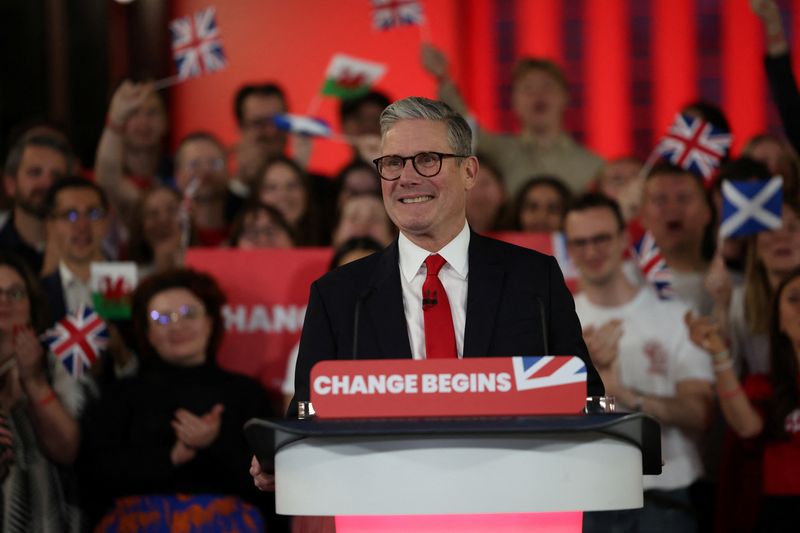
By William Schomberg
LONDON (Reuters) – Britain’s next prime minister Keir Starmer spent the election campaign accusing Rishi Sunak’s Conservatives of “14 years of economic failure”, but he has no obvious quick fix to lift the country out of its slow-growth rut.
Living standards have stagnated since Conservatives took power in 2010 and Britain’s recovery from the COVID pandemic has been the weakest among big rich nations after Germany.
Starmer will be under pressure to use Labour’s huge majority in parliament to end the sense of decline, from creaking public services and inflation-hit personal finances to a shortage of housing and weak business investment.
But with public debt at almost 100% of gross domestic product and taxes at their highest since just after World War Two, Starmer stresses the turnaround will take time.
“We’re going to have to do really tough things to move the country forward,” he told voters days before the election. “There is no magic wand.”
Unlike in 1997, when Labour under Tony Blair ousted the Conservatives with the economy expanding by almost 5% that year, Starmer might struggle to get British annual growth above 2% in the foreseeable future, in line with much of a sluggish Europe.
Britain’s economy is expected to grow by less than 1% this year.
The 2007-08 global financial crisis which hit Britain particularly hard, cuts to many areas of public spending and the shocks of Brexit, COVID and surging energy prices have combined to weigh on the world’s sixth-biggest economy.
But Starmer and his likely choice of finance minister Rachel Reeves say they will not go on a borrowing binge to fund a growth push, with memories still fresh of the 2022 bond market rout under former Conservative prime minister Liz Truss.
They have also promised no major tax increases, leaving the new government with little room in the budget.
“The fiscal inheritance will be a difficult one and there are a lot of challenges to address,” Lizzy Galbraith, a political economist with investment firm abrdn, said.
Unlike in 1997, when Labour stunned financial markets by handing operational independence to the Bank of England, its first economic policy move is likely to be low key.
It plans to move quickly to reform Britain’s archaic planning system to speed up investment in house-building and infrastructure, part of a plan to improve the country’s weak productivity, support growth and generate more tax revenues to invest in health and other strained public services.
The Conservatives balked at upsetting core supporters in suburban areas where much of any surge in residential construction is likely to happen.
Starmer promises to be hard-headed about breaking down the barriers to growth, but the challenge will be big.
“We’ve been here before with an incoming government promising planning reform and it gets watered down in office,” Galbraith at abrdn said.
Jack Paris, chief executive of InfraRed, an international infrastructure asset manager, expects Labour will turn more to private investment for green energy and speed up transportation projects.
“The new UK government should provide increased clarity and visibility to investors with a long-term infrastructure strategy representing a catalyst to making the UK again one of the most attractive destinations for long-term investors,” he said.
DROP-OUT BRITAIN
Also on Starmer’s to-do list is reversing the post-pandemic rise in people dropping out of the jobs market due to sickness, something other rich economies have already done.
The Boston Consulting Group and the NHS Confederation, representing much of the health service, estimate that getting three-quarters of workforce dropouts since 2020 back into the jobs market could boost tax revenues by as much as 57 billion pounds in total over the next five years.
For context, Britain spends around 11 billion pounds a year running its justice system.
Starmer’s growth plan also includes lowering some of the barriers to trade with the European Union. But he has ruled out a major reworking of Britain’s Brexit deal.
Economists say Labour’s policies to date are unlikely to make a big difference, much less meet Starmer’s goal of turning Britain into the Group of Seven leader for sustainable economic growth, something it has barely managed since World War Two.
Higher public investment would be growth-positive but Labour pledges to cut immigration could have the opposite effect.
Analysts at Goldman Sachs say Labour’s reforms will boost Britain’s economic growth in 2025 and 2026 by just 0.1 percentage point each year.
Economists polled by Reuters last month expected the economy would grow by 1.2% in 2025 and 1.4% in 2026, less than half its pace in the 10 years before 2007.
But in some ways Labour is inheriting an economy that is turning a corner, a point Sunak tried in vain to sell to voters.
After a recession in 2023, a recovery is under way and high inflation has now abated, allowing the Bank of England to start cutting interest rates possibly as soon as next month. Business and consumer confidence are on the rise.
Starmer says – and many business leaders agree – that political stability will help attract investment to Britain after a turbulent eight years in which the country was run by five different Conservative prime ministers.

Investors are already warming to the UK’s lower risk profile in the light of rising populism in France and the United States.
Laura Foll, a portfolio manager at Janus Henderson Investors, linked a recent out-performance of UK shares to that shift in perception. “Relatively, the UK, from a political standpoint, is looking in far better shape,” she said.
This post is originally published on INVESTING.



